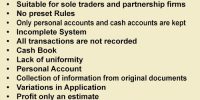17 principles of effective internal control are as follows:
- Demonstrate commitment to integrity and ethical values.
- Ensure that board exercises oversight responsibility.
- Establish structures, reporting lines, authorities and responsibilities.
- Demonstrate commitment to a competent workforce.
- Hold people accountable.
- Specify appropriate objectives.
- Identify” and analyze risks.
- Evaluate fraud risks.
- Identify” and analyze changes that could significantly affect internal controls.
- Select and develop control activities that mitigate asks.
- Select and develop technology controls.
- Deploy control activities through policies and procedures.
- Use relevant, quality information to support the internal control function.
- Communicate internal control information internally.
- Communicate internal control information external llv.
- Perform ongoing or periodic evaluations of internal controls (or a combination of the two).
- Communicate internal control deficiencies.














